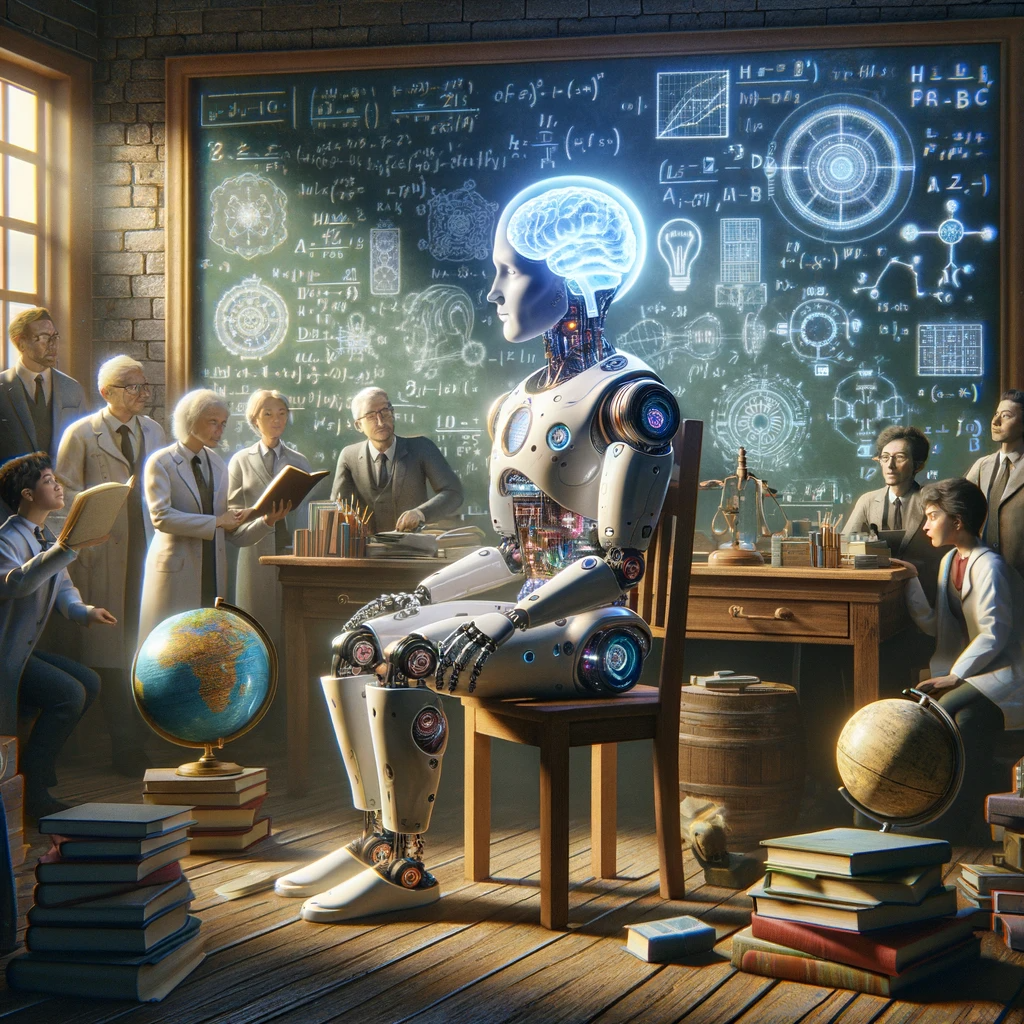How smart is AI, you might ask?
That query has left many people puzzled.
The world of artificial intelligence (AI) can seem like an enigma wrapped in layers of complexity. One moment, we’re marveling at its ability to outsmart humans in games like chess and Go; the next, we’re scratching our heads over some inexplicably odd behavior.
We often hear about how advanced these systems are becoming – but just how smart is AI, really?
Table of Contents
The Intelligence of AI Systems
AI systems have been making headlines, from passing high-school Advanced Placement tests to playing advanced chess. But how smart are these intelligent machines really?
We’re living in an era where weak human + machine can outperform the best humans at many tasks, including complex cognitive work and even high-level chess games. This great computational power is impressive but doesn’t equate to authentic intelligence.
In fact, some argue that we should call it augmented intelligence rather than artificial intelligence because what these powerful AIs partnering with us do is augment human abilities [1].
How AI Systems Can Appear Intelligent
Advanced computers are perceived as ‘intelligent’ due to their extraordinary capacity for quickly and accurately processing large amounts of data. For instance, they can analyze millions of images or texts within seconds and make decisions based on this analysis.
This remarkable capability may seem like a signifier for genuine understanding or cognition – however, it isn’t quite so straightforward [2]. These systems aren’t thinking entities; instead, they’re pattern recognition engines operating under algorithms designed by humans.
The Concept Of “Shortcut Learning” In AI
“Shortcut learning” refers to a method employed by most current-day AIs wherein correlations between different variables are identified without necessarily comprehending underlying principles—a far cry from Alan Turing’s philosophy about machine intelligence [4].
This approach enables them not only to handle lower-level routine tasks efficiently but also to compete experts predictably well at certain cognitively routine works such as language translation or image classification – all without truly grasping the concepts involved [6].
To sum up: while shortcut learning allows our digital companions to perform impressively across various domains—how computers interact determines its level—it shouldn’t be mistaken for anything close resembling true comprehension akin to human intellect working.
To Summarize:
AI’s impressive computational prowess, enabling it to swiftly process vast data and perform complex tasks, often masks the reality – it isn’t authentically intelligent. It’s more about augmented intelligence than artificial; a pattern recognition engine that excels in ‘shortcut learning’, not genuine understanding.
Anthropomorphism and AI
The concept of anthropomorphizing artificial intelligence is not new. We tend to attribute human characteristics or behaviors to non-human entities, in this case – technology.
In essence, our inherent need for social interaction can lead us into thinking that these AIs possess a level of authentic intelligence akin to ours.
Human Tendency Towards Anthropomorphism in Technology
This tendency towards attributing human-like qualities isn’t limited just to how we interact with the likes of Siri, Google Assistant, and other intelligent machines. It extends even further when it comes down to machine intelligence capabilities such as complex cognitive work. This could easily influence decisions about their true abilities which might be far from reality.
- We see an entity responding intelligently (even though artificially), leading us to forget its actual nature – a programmed system devoid of any real understanding.
- We perceive advanced computers processing natural language fluently, giving them the illusion of being smarter than what they truly are.
- Last but not least, due to the lack of proper evaluation methods, we sometimes mistake great computational power for deep comprehension of topics discussed by AI systems.
Misconceptions About The Capabilities Of Conversational AIs
A classic example would be IBM’s famous Watson that once won Jeopardy against two former champions using powerful AI, partnering data analysis, and rapid search through millions of documents for relevant answers; however, it didn’t actually understand the questions nor did it comprehend the responses given back by the contestants on the show.
To put it simply: while conversational AIs may seem intelligent due to their ability to process natural language fluently, their knowledge base remains entirely programmed by humans without any real understanding involved. This leads us full circle, where despite appearing smart, their programming capabilities lack the true cognitive abilities associated with augmenting human intellect. Remember not to overestimate current technologies based solely on how well they imitate aspects of conversation.
To Summarize:
While we often attribute human-like qualities to AI, it’s crucial to remember that these systems lack genuine understanding. They may process language fluently and appear intelligent, but their capabilities are entirely programmed by humans without any real comprehension involved. Don’t mistake complex coding for true intellect.
Evaluating the Performance of GPT-4
OpenAI’s advanced system, known as GPT-4, is making waves in the world of AI. It has showcased impressive results on several benchmarks, but it’s crucial to tread lightly when interpreting these achievements.
Understanding GPT 4’s High School Test Performance
Gone are the days when passing high school level tests was solely a human feat. Now we have intelligent machines like GPT-4 acing them with ease. But does this mean they possess authentic intelligence akin to humans? Not quite.
The machine intelligence at work here can process vast amounts of information quickly and accurately – an aspect where powerful AIs partnering with weak human + machine + systems could easily influence decisions or compete. Experts predict that future technology will only enhance this ability further.
Shallow Heuristics vs Sophisticated Theory of Mind
Digging deeper into how GPT-4 operates reveals its reliance more on shallow heuristics than developing a sophisticated theory reflective of Alan Turing’s philosophy about artificial consciousness. While it might be adept at predicting what comes next based on patterns learned from training data, understanding why those sequences occur remains beyond its grasp – areas where our complex cognitive work excels over current AI models such as GPT-4.
Alien Intelligences and Their Evaluation
Rather than referring to extraterrestrial life forms, ‘alien’ in the context of artificial intelligence signifies how AI systems approach problem-solving and information processing differently from humans. Instead, it’s a metaphorical term that highlights how AI systems approach problem-solving and information processing in ways fundamentally different from human cognition.
Why AI is referred as ‘alien’ by many researchers
The alien nature of machine intelligence becomes evident when we consider advanced AIs like AlphaGo. This powerful system didn’t defeat world champion Go players by mimicking human strategies but through its own unique techniques – an authentic display of ‘alien’ intelligence at work.
Need for improved evaluation methods
Evaluating these alien intelligences isn’t straightforward with our current benchmarks focusing primarily on task performance instead of the complex cognitive work involved. We need more comprehensive methodologies that delve into the underlying processes used during problem-solving by these machines.
- Acknowledging their great computational power while also recognizing limitations tied to lower-level routine tasks,
- Focusing not just on whether they can play high-level chess games but understanding the process behind each move,
- Determining if they are capable enough to compete against experts and predict outcomes accurately based solely upon data inputs without any prior knowledge about context or domain-specific nuances.
Impact Of Increasingly Influential AIs In Our Lives
The incredible advances in AI are transforming our lives and workplaces. As AI continues to become increasingly influential in our lives, it is clear that the implications for how we live and work are profound.
In the same way that human abilities have been augmented by machines, AI has begun to perform complex cognitive work once thought exclusive to humans. But this doesn’t mean they’re replacing us – far from it.
Rather than seeing them as competitors, experts predict powerful AIs partnering with humans can produce augmented intelligence—a combination of machine efficiency and human intuition—that could revolutionize industries across the board.
Future implications if current trends continue
If you think AI’s influence is significant now, hold on tight because things are only going to accelerate. We’re already witnessing intelligent machines taking over lower-level routine tasks while augmenting our capabilities for higher-order thinking. Forbes discusses ways AI will change everyday life.
This isn’t without its challenges though – like any technology wielding great computational power, there comes potential risks such as biased algorithms influencing decisions unfairly. Towards Data Science provides insights into bias in Machine Learning. As these systems become more integrated into cognitively routine work processes—such as advanced chess games—we must ensure their decision-making process requires authentic intelligence rather than simple rule-following or pattern recognition.
To achieve this balance between utility and ethical use, we need robust experimental methodologies along with reliable benchmarks for evaluating an AI system’s sophistication level. IEEE Xplorer talks about evaluation methods for Artificial Intelligence Systems. This approach allows us not just to call authentic but also to make informed judgments regarding where they excel—and importantly—where improvements are needed based on Alan Turing’s philosophy of testing machine vs human intelligence.
To Summarize:
AI’s rapid development is transforming our lives, not by replacing us but by augmenting human abilities with machine efficiency. As AI takes on more complex tasks and becomes further integrated into our daily routines, it’s crucial to balance its utility with ethical use. We must ensure that these systems operate based on authentic intelligence rather than simple rule-following or pattern recognition, requiring robust testing methodologies
Conclusion
Despite advances, AI is still not as intelligent as humans.
The appearance of smartness in AI often comes from ‘shortcut learning’ rather than true understanding.
We as humans tend to anthropomorphize these systems, attributing them with more capabilities than they truly possess.
GPT-4 is impressive but still relies on shallow heuristics instead of developing a sophisticated theory of mind like humans do.
AIs are often referred to as ‘alien’, due to their unique problem-solving methods and the need for better evaluation measures arises here.
With AI becoming increasingly influential in our lives, we must develop better methodologies and benchmarks for assessing its sophistication level accurately.
If you’re interested in diving deeper into how smart is AI or other cutting-edge digital technology topics such as data science and large language models, consider exploring digitapha. Here you’ll find insightful articles that will help unravel the complexities of these fascinating subjects. Start your journey today!





